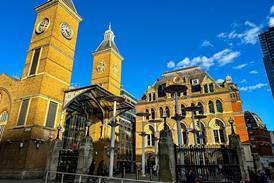Landlords of buildings with polyethlene cored ACM panels and foam insulation are being urged to take action
A type of cladding and insulation used in more than 80 tower blocks across England has failed safety tests and represents a “significant fire hazard”, the government has revealed.
The news comes as the government announced an independent review of fire safety regulations covering the design, construction and ongoing management of buildings.
The warning has been prompted by results of a new fire safety test released today of a type of cladding - ACM panels with polyethylene filler and foam insulation - used in scores of buildings across the country.
The Department for Communities and Local Government said the wall system did not adequately resist the spread of fire over the wall to the standard required by the current Building Regulations guidance. The test was carried out by BRE on behalf of the communities department to the requirements of BR135, one of the routes to compliance with Part B, the building regulation for fire safety.
The communities department said an independent expert panel had advised, based on the test results, ‘that they do not believe any combination of these materials (ACM with unmodified polyethylene filler and foam insulation) would meet current Building Regulations guidance…This combination of materials therefore presents a significant fire hazard on buildings over 18m,’
The test results revealed that in the event of a fire, it would take just 6½ minutes for the outside of the cladding to reach temperatures of more than 800 degrees Celsius.
The test had to be stopped due to flames “several metres” above the top of the model used for testing, according to the BRE report. The cladding system was given a category 3 rating, which means it “has no flame retardant properties.”
Landlords of such buildings are being urged to take remedial action and remove cladding.
The communities department said that “82 buildings are currently known to have this combination of materials in their wall cladding systems - 47 of which are local authority or housing association owned or managed.”
The new tests have been commissioned by the government amid mounting fears over fire safety for thousands of people living in high rise flats across the country.
The test was more stringent than the first checks done after the Grenfell Tower fire, which only looked at the core of cladding panels with the aluminium outer skins removed.
Each test involves building a nine-metre-high demonstration wall with a complete cladding system including cladding panels, insulation and cavity barriers. This is then subjected to a replica of a severe fire inside a flat as it spreads out of a window, to see whether it meets the requirement to resist vertical fire spread.
Some three different types of ACM cladding are being combined with two different types of insulation to test their combustibility when taken together – meaning that six combinations are being tested in total.
The review will focus on the fire safety of tall buildings and will be chaired by Dame Judith Hackitt, a chemical engineer and chair of Manufacturers’ organisation EEF. She was chair of the Health and Safety Executive from October 2007 to March 2016.
As part of the review, Hackitt will consult the construction and housing industry, MP’s and the public. She will also take advice from fire and international experts and the Buildings Regulations Advisory Committee.
The terms of reference for the review will be published this summer after those for the Grenfell Tower Public Inquiry have been agreed. It is expected that the review will present an interim report before the end of the year, and a final report no later than spring 2018.
The government said it would act swiftly on any recommendations from the review to make sure people living in high rise buildings are safe.
At least 80 people died in the Grenfell Tower blaze in Kensington, London, in June. It emerged last night that Kensington and Chelsea Council and Kensington and Chelsea Tenant Management Organisation could face corporate manslaughter charges over the fire.













No comments yet